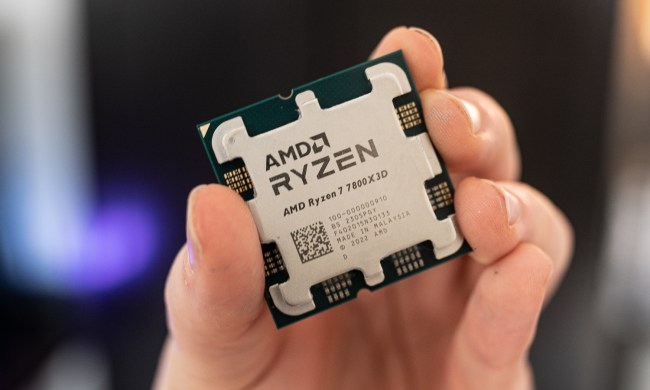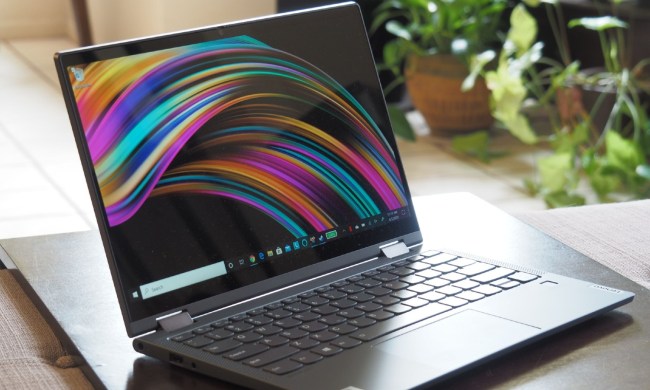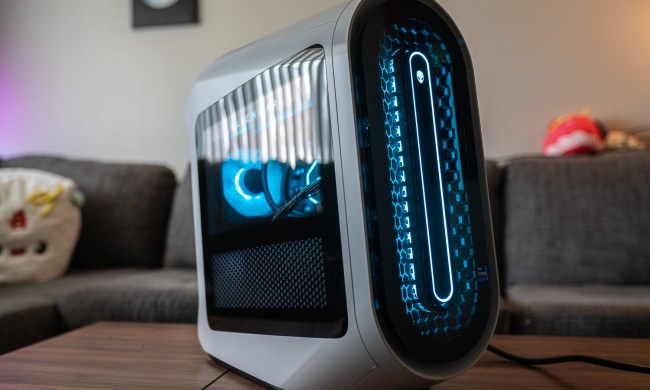“The Dell Inspiron 15 is a keen gaming weapon with a few rough edges.”
- Affordable price
- Powerful GPU
- Quick SSD
- Fairly quiet
- Visibly poor display
- Flimsy touchpad
- Overly large, awkward size
Budget gaming laptops are defined by their shortcomings — it’s in their nature. These machines compromise some aspects in favor of others, so they provide decent gaming performance without crossing that perilous $1,000 threshold. The latest Dell Inspiron 15 7000 Gaming fits that bill perfectly.
Featuring an Nvidia GeForce GTX 1060 graphics card with Max-Q design, an Intel Core i5-7300HQ processor, 8GB of RAM, and a 256GB SSD, the Inspiron 15 7000 Gaming – more commonly known as the 7000 Gaming — starts at just $900. You can already see some of the corners Dell had to cut to keep costs down. Did they cut too deep?
Sharp edges
Externally, the design is a continuation of the previous model. Dell sticks the sharp, angled edges which gave the Inspiron its characteristic look and feel. Though less gamer-chic than most gaming laptops, it’s different enough to stand apart from plain old business laptops.
The black-on-red design is understated enough that it doesn’t stick out, but coupled with the red backlighting on the keyboard, there’s enough attitude here that it still feels like a gaming laptop, even if it might not feel like a gamer laptop.
Unfortunately, those visually interesting angled edges have the effect of making the display bezels appear overlarge. The design elements increase the overall footprint of the laptop quite a bit. During our testing we had some trouble fitting it into a messenger bag designed for 15-inch laptops.
Dell stuck with the sharp, angled edges that gives the Inspiron its characteristic look and feel.
All that extra plastic makes the Inspiron 15 feel bloated, hollow, and over-sized. Compared to the Acer Predator Helios 300, which has a similar overall footprint, the Inspiron 15 feels bigger than it needs to be. Naturally, we wouldn’t expect the same level of engineering from a budget laptop that we see in something like the Razer Blade, but it’s good example of how small a gaming laptop with a GTX 1060 inside can be. Laptops typically get smaller, slimmer over time, each iteration getting a bit more svelte than the last. That’s not the case here.
In fact, just two models back, the late 2016 version was slimmer, lighter, and had a smaller overall footprint. In a lot of ways, the design of the new Inspiron 15 7000 Gaming feels like a step backward rather than a step forward.
Plenty of USB-A, and a little USB-C
The Inspiron 15 features the standard array of ports — three USB-A ports, one USB-C port, an HDMI port, a headphone jack, an SD card slot, an Ethernet jack, and of course a Kensington lock you’ll probably never use. There’s enough real estate here that you never feel cramped, and everything is right where it should be.
Flexible, and not in a good way
The Inspiron’s keyboard features a red backlight like the previous model, along with the black-on-red keycaps. The keys themselves feel like a bit of a step backward, though. The travel is nice and deep, but the key caps have a slightly gritty texture that never goes away.
Compared to typing on a laptop like the Dell XPS 13 or Dell XPS 15, there’s a marked difference. The XPS lineup feels crisp and clean, and the keycaps are slick and comfortable under your fingertips. The keyboard here feels like it was another corner cut to keep costs down.
That uncomfortable key texture is the same texture you’ll find on the touchpad. It’s a bit less pronounced, since you won’t be resting your fingers on it as long as you would a typical keyboard, but it has its own share of issues.
The touchpad feels unresponsive compared to the previous Inspiron 15 model. Multi-touch gestures, like using two fingers to scroll up or down or two fingers to right-click, often need to be repeated more than once in order to be detected. On top of that, the touchpad doesn’t exactly inspire confidence. Press too hard, and it bends inward more than a standard touchpad does.
By comparison, the Acer Predator Helios 300 offers a keyboard and touchpad combo that just gets the job done without any bizarre missteps. The touchpad is slick and responsive, and the keyboard feels like a keyboard.
It’s the same kind of basic functionality you see in the Omen EON-15 S. Its keyboard and touchpad aren’t anything to write home about, and that’s a good thing. They get out of your way and let you do your work without being noticed. Sometimes it’s not such a bad idea to be forgettable.
Better and worse
Budget gaming laptops often fall short when it comes to display quality. It’s an easy aspect to neglect in order to pack a more powerful GPU inside without pushing the price too high. Unfortunately, in the Inspiron 15’s case, Dell cut a little too deep.
The display shows colors slightly-off hue. Lime green becomes pea green, crimson is dull red.
The 1080p display on the Inspiron 15 gives everything a slightly-off hue. Lime green becomes pea green, crimson becomes dull red, and so on. Familiar colors, the likes of which we see every day in company logos, become a bit unfamiliar on the Inspiron 15’s display. Just right click on the desktop and open up the Nvidia Control Panel.
That familiar neon Nvidia green is completely sapped of life by this display, and pushed toward yellow. The same goes for the familiar verdant green of Spotify’s logo, or the bright red of LastPass. Blues tend to get by with minimal distortion, though, so Microsoft Outlook’s characteristic sky blue is mostly unaffected.
Our display benchmarks below illustrate just what it is that this display does wrong — and what it does right.
There are a couple important things to note about these results. First, the Inspiron’s display is well below average in a few areas, but it’s better than the display on the previous Inspiron model, if only by a narrow margin. That, however, doesn’t forgive its absolutely awful color gamut. Most laptops, as you can see here, land in the 70-75 percent range of the AdobeRGB color space. On top of that, even the most basic monitor can usually hit about 90 percent of the sRGB color space.
The Inspiron 15’s display falls well short of both. It’s only capable of rendering 46 percent of the AdobeRGB gamut, and 61 percent of the sRGB color gamut. On top of that, its color accuracy is off by a significant margin. Still, an average color error of 3.28 isn’t as bad as the previous model’s score of 9.0.
Colors were so inaccurate they pushed well into the realm of “these colors look really weird.” This Inspiron 15’s display isn’t that bad, but it’s still ill-suited to any sensitive color work like photo editing, and you’re likely to notice that colors look off during everyday use. It’s an unfortunate and glaring flaw on an otherwise capable laptop.
High volume
Speaking of elements manufacturers sometimes skimp on in order to keep costs low, speakers are usually high on that list. Fortunately for the Dell Inspiron 15 7000 Gaming, the speakers here manage to get the job done without any real issues. At high volumes, sound is clear and loud, and capable of filling a room.
Even at low volumes details come through clear enough, and they’re not smothered by bass. Big sound can become a little abrasive though, especially explosions in games like Battlefield 1 and Star Wars Battlefront II. It’s a minor issue, and otherwise the speakers are capable enough in everyday situations.
Humble, reliable performance
The included Intel Core i5-7300HQ processor gets the job done in most everyday tasks. It’s a holdover from the previous Inspiron model, so no surprises here. For everyday use, it’s an admirable performer. It never slowed us down while web browsing, running Microsoft Office, or editing multiple spreadsheets at once. Looking at the numbers, it’s pretty clear this processor is — a humble workhorse.
On Geekbench it scored right around the mid-range of what we’d expect from a mobile Core i5, hitting 3,760 on single core performance, and 9,915 on multi-core performance. That’s almost exactly what we saw out of last year’s model, and it comes in right behind the HP Omen 15 and the Origin EON 15-S, both of which feature quicker Core i7-7700HQ processors.
Moving on to a real-world test, a 4K video encode, you can see how close the Inspiron’s processor gets to its quicker siblings in everyday use. The Dell Inspiron 15 7000 Gaming finished the encode in a little under eight minutes, while the HP Omen finished in just under seven and a half minutes.
With the Inspiron’s Core i5, you’re not going to be lacking horsepower.
It’s not a huge gap in performance, but it does illustrate a couple important points. First, with the Inspiron’s Core i5, you’re not going to be lacking in processing horsepower. It’s not going to hold you back in everyday use, but you will see a little slowdown when performing processor-intensive tasks like video encoding.
Secondly, if you do plan on using the Inspiron for processor-intensive tasks on a regular basis, you might want to consider stepping up to the Core i7, so you’re not chafing against the limits of your processor while you’re trying to get some video editing done.
Small, but speedy storage
The 256GB SSD in the Inspiron is remarkably fast for a budget machine, easily surpassing the speed we see in its more expensive counterpart, the Acer Predator Helios 300. During our tests the Inspiron hit a read speed of 2,171 megabytes-per-second, and a write speed of 1,186. The Acer Predator Helios 300 hit a read speed of 1,261 MB/s, and a write speed of 1,153 MB/s.
It’s clear that the SSD in the Inspiron 15 7000 Gaming is a big improvement over the previous model, which barely managed half of the Inspiron 15 7000 Gaming’s write speed. Looking at similarly priced competitors, the Inspiron’s lead is even more impressive.
The Origin EON 15-S does manage to beat out the Inspiron in write speed, but only just. The Inspiron’s SSD is actually a bit quicker than the drive in the much more expensive Dell XPS 15, which hit a read speed of 1,594 MB/s, and a write speed of 1,105 MB/s.
The Inspiron’s 256GB PCIe drive may be quick, but it’s a bit small for a gaming laptop. Those gigabytes will go fast. It offers more than enough for a few games and your typical files, but you may need to rely on an external hard drive. With that said, we don’t recommend a hard disk instead, as it will load games far more slowly and feel less responsive in day-to-day use.
Quick and quiet
This most important part of any gaming laptop review, right? Let’s cut to the chase — the Inspiron 15 7000 Gaming, boasting an Nvidia GeForce GTX 1060 with Max-Q design, offers excellent performance in a very quiet package.
Even under heavy load, the GTX 1060 and its complement of cooling fans never get too loud. That’s thanks to the Max-Q design. By underclocking the graphics card, Nvidia can keep it a bit cooler and a bit quieter than it would be otherwise. Even so, the GTX 1060 with Max-Q design is more than capable of running games at top speed.
Looking at 3DMark scores below, you can get an idea for how the Inspiron 15 7000 Gaming stacks up to both the previous model, and its nearest competitors, the Origin EON 15-S and the HP Omen 15. Here, the HP Omen pushes ahead with a score of 8,755 on the Fire Strike benchmark, and the Inspiron 15 comes in just behind with 8,478. The Origin EON 15-S and the previous Inspiron 15 are neck-and-neck with their GTX 1050 Ti graphics cards, hitting 6,874 and 6,553 on Fire Strike, respectively.
Right off the bat, you can see you’re going to get much better performance out of the GTX 1060 with Max-Q design than you will with a GTX 1050 Ti. Our in-game benchmarks reinforced that initial impression.
It’s clear that the GTX 1050 Ti — while an admirable performer — just can’t hold a candle to the GTX 1060. In Deus Ex: Mankind Divided, for instance, the Origin EON 15-S hit 33 frames per second at High detail settings, while the HP Omen 15 and its GTX 1060 hit a breezy 45 FPS. The Inspiron 15 7000 Gaming pushed even further ahead, coming in at 51 FPS.
Those margins remain intact as we move into the Ultra preset in Deus Ex. The Origin EON 15-S hit a barely playable 23 FPS, while the HP Omen 15 managed to stay around 31 FPS. The Inspiron 15 7000 Gaming hit an impressive 37 FPS, which is actually right around what we got out of the most recent Razer Blade, which came in at 38 FPS. So, the modest $900 Dell Inspiron 15 7000 Gaming performs nearly as well, in games, as the $1,850 Razer Blade.
Moving on to a less demanding game, Battlefield 1 saw the Inspiron 15 7000 Gaming hit 65 FPS on the Ultra preset, while the previous model topped out at 44 FPS, and the Origin EON 15-S managed 51 FPS.
Overall, the GTX 1060 offers a big enough improvement over the GTX 1050 Ti that you’re going to notice it in everyday gameplay. You’ll be able to push your settings higher without seeing your FPS dip below playable levels.
Big and heavy
The first thing you’ll notice about the Inspiron is its size — especially the first time you try to put it into a messenger bag to carry it into the office. It has a larger footprint than most other 15-inch laptops, thanks to its design, which uses a lot of excess plastic on the chassis. At 5.82 pounds, you’ll also feel it when you’re carrying it around.
When it comes to battery life, the Inspiron 15 gaming features decent, if not awe-inspiring longevity. On our video loop test it managed to last about five and a half hours, a bit more than the previous model, which came in at just over five hours.
Overall, during our time with the Inspiron 15 7000 Gaming, we saw about four to five hours out of a single charge during mixed use, which isn’t bad — but it’s not great, either. It means you’re going to need to carry around the charger, which weighs a couple more pounds, if you plan on using this laptop away from home for more than half a day.
Software
The Inspiron 15 7000 Gaming is mostly bloatware-free. It features a few Dell utilities that are easy enough to uninstall, and one very unwelcome addition, the ubiquitous McAfee trial. It’s intrusive, it pops up at the most inopportune moments, and it constantly begs for money. If you choose to invest in an Inspiron 15 7000 Gaming, just get rid of that thing before you do anything else.
Warranty information
The Dell Inspiron 15 7000 Gaming features a standard one-year warranty against manufacturer defects, it’s the standard Dell warranty you’ll typically see on any of their laptops.
Our Take
Budget gaming laptops are almost always a mixed bag. You get decent gaming performance for less than a thousand dollars, but you’ll typically end up paying for it in some other area — usually display quality. That’s definitely the case here. The Inspiron 15 7000 Gaming is a powerful laptop capable of running games just as well as its much more expensive counterparts, but let’s take a closer look to find out if its flaws outweigh its strengths.
Is there a better alternative?
If you’re willing to spend a little extra, the Acer Predator Helios 300 is a solid alternative at $1,000. Likewise, the Asus ROG Strix GL703VM features the same graphics card, but a much better display (with 120Hz refresh rate) for around $1,600 depending on spec. But those are substantial price jumps, and if your budget tops out at $900, the Inspiron 15 7000 Gaming offers the best performance you’re likely to see — despite its many flaws.
How long will it last?
The internal components in the Inspiron 15 7000 Gaming are very middle-of-the-road, aside from the graphics card. Chances are you’re going to see that Core i5 processor and those 8GB of RAM start to bottom out after about a year or so. You’re going to feel those limitations sooner rather than later.
Should you buy it?
If you have an external monitor you’ll be hooking this laptop into, sure, it’s not a bad buy. But if you plan on using it on its own, you should look at other options. The display spoils what is otherwise a decent budget gaming laptop.









